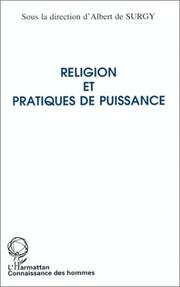| Listing 1 - 2 of 2 |
Sort by
|

ISBN: 2738450350 9782738450357 Year: 1997 Volume: *4 Publisher: Paris: L'Harmattan,
Abstract | Keywords | Export | Availability | Bookmark
 Loading...
Loading...Choose an application
- Reference Manager
- EndNote
- RefWorks (Direct export to RefWorks)
Bijgeloof --- Croyances populaires --- Folk beliefs --- Hermetic art and philosophy --- Magic --- Magical thinking --- Magie --- Magisch denken --- Mystical-magic thinking --- Necromancy --- Pensée magique --- Sorcery --- Spells --- Superstitie --- Superstities --- Superstition --- Superstitions --- Traditions --- Volksgeloof --- Religion and sociology --- Religion --- Witchcraft --- Sociologie religieuse --- Sorcellerie --- Comparative studies --- Anthropological aspects --- Social aspects --- Etudes comparatives --- Aspect anthropologique --- Aspect social --- Religion. --- Religion, Primitive --- Atheism --- God --- Irreligion --- Religions --- Theology --- Comparative studies. --- Anthropological aspects.

ISBN: 9780226069913 0226069915 9780226069906 0226069907 9786611959180 0226069923 1281959189 9780226069920 Year: 2007 Publisher: Chicago : University of Chicago Press,
Abstract | Keywords | Export | Availability | Bookmark
 Loading...
Loading...Choose an application
- Reference Manager
- EndNote
- RefWorks (Direct export to RefWorks)
During the Enlightenment, Western scholars racialized ideas, deeming knowledge based on reality superior to that based on ideality. Scholars labeled inquiries into ideality, such as animism and soul-migration, "savage philosophy," a clear indicator of the racism motivating the distinction between the real and the ideal. In their view, the savage philosopher mistakes connections between signs for connections between real objects and believes that discourse can have physical effects-in other words, they believe in magic. Christopher Bracken's Magical Criticism brings the unacknowledged history of this racialization to light and shows how, even as we have rejected ethnocentric notions of "the savage," they remain active today in everything from attacks on postmodernism to Native American land disputes. Here Bracken reveals that many of the most influential Western thinkers dabbled in savage philosophy, from Marx, Nietzsche, and Proust, to Freud, C. S. Peirce, and Walter Benjamin. For Bracken, this recourse to savage philosophy presents an opportunity to reclaim a magical criticism that can explain the very real effects created by the discourse of historians, anthropologists, philosophers, the media, and governments.
Ethnophilosophy --- Magical thinking. --- Philosophy and civilization. --- Semiotics. --- History. --- Magical thinking --- Philosophy and civilization --- Semiotics --- Mystical-magic thinking --- Fantasy --- Magic --- Thought and thinking --- Folk philosophy --- Indigenous peoples --- Philosophy, Primitive --- Primitive philosophy --- Cognition and culture --- Ethnology --- Philosophy --- Semeiotics --- Semiology (Linguistics) --- Semantics --- Signs and symbols --- Structuralism (Literary analysis) --- Civilization and philosophy --- Civilization --- History --- critical, critique, criticism, savage, philosophy, philosopher, philosophical, enlightenment, time period, era, western, race, racial, racialized, racism, knowledge, identity, ideality, scholars, researchers, academic, scholarly, research, animism, soul, migration, ideal, discourse, physical, ethnocentric, ethnicity, native american, postmodernism, marx, nietzsche, proust, peirce, benjamin.
| Listing 1 - 2 of 2 |
Sort by
|

 Search
Search Feedback
Feedback About UniCat
About UniCat  Help
Help News
News